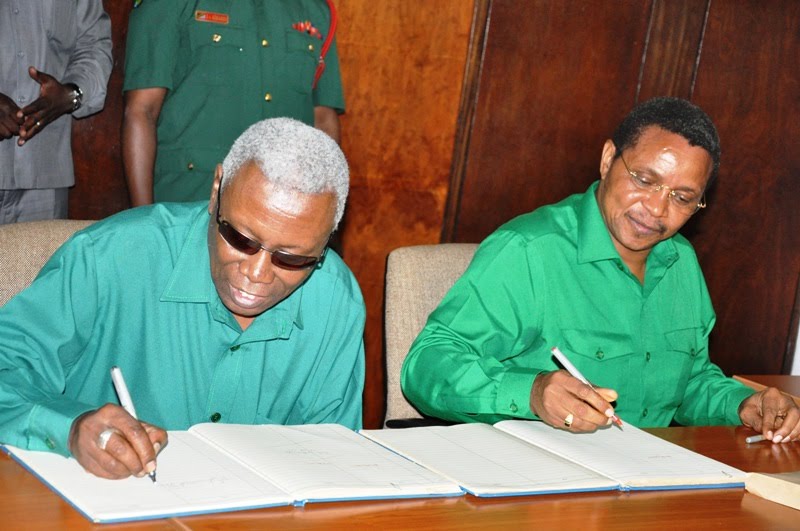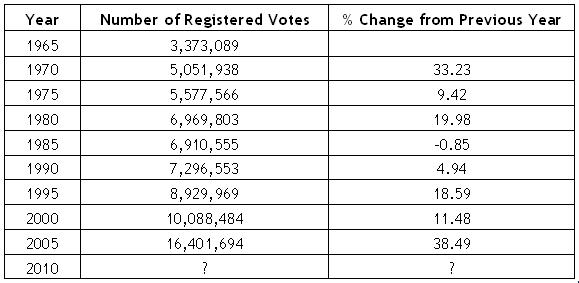
Since we are nearing the next round of presidential and national assembly elections, I thought it would be interesting to begin a conversation about whether or not we can view Tanzania as a democracy.
We cannot think about other countries when using the term democracy. Too many times we idealize certain states’ rhetoric about being “successful democracies” only to find that these rhetoric are based on sensationalism or skewed definitions.
According to the Oxford Dictionaries Online, a multiparty democracy is a state that is organized through “a system of government by the whole population or all the eligible members of a state , typically through elected representatives“. In other words, a democracy entails providing people with the access to build a system of leadership to govern their socio-economic livelihoods.
There are many ways we can analyze how Tanzania fits this description. But to start things off, I wanted to compare different years’ registered vote counts as a simple method to indicate (not necessarily confirm) interest in and access to voting:

All of the above figures are from African Elections – Tanzania website, which refers to Tanzania as an emerging democracy.
Interestingly, African Elections only refers to Tanzania as an emerging democracy after 1995 (this will make the upcoming elections this year the fourth multiparty elections in Tanzania’s history). Tanzania is called a one-party state up until the period of 1992-1995, referred to as a multiparty transitional phase. Also, Zanzibar is labeled as an emerging democracy from way back in 1963. At the same time, the numbers above indicate that the changes in the number of registered voters have no real pattern. So what is really going on?
At least two things can be contemplated at this point:
- Does Tanzania’s political system increase or decrease Zanzibar’s political, social, and economic autonomy?
- Do the people of Tanzania really have the freedom (ie: access) to vote?
What do you say?


I think people have access to vote but most are disillusioned, especially those in rural Tanzania.
And why do you think they are?
I just found out that many people in rural areas (many of whom vote) think Nyerere is still the president. Does that still make us a democratic country? I beg to differ…
@Anon:
My näive mind makes me more likely to believe that *some* people in rural areas still think Nyerere is the president; ommitting the ‘many people’ and ‘many who vote’ in your statement. I remember that statement used to refer truthfully to the Hadza people living in the forests in Arusha/Manyara – but I doubt if rural villagers in the rest of the republic are so mis-informed to think we have the same president for the past 50 years! If this is true, and that the ‘uninformed’ people make up the majority of our population – then we are trully not a democratic nation, or rather we are a democracy of ‘ushabiki wa vyama tu’.
I just hope we have enough grassroots organizations that mobilize people in the rural Tanzania to prepare them in asking apt questions to these candidates and be able to critically vet them.
Inachosha kuona kisikia makofi, vigelegele na midundiko katika kipindi cha kampenseli bila ya kuwepo maswali kutoka kwa wananchi na majibu yanayozingatia ‘facts’ kutoka wagombea.
@Anon: Hahahahahaha… you guy, be serious! You mean to tell me people didn’t see or hear about the nation paying its last respects to Mwalimu in the national stadium?
But I hear you. There seems to be a problem with complete transparency, especially in rural areas, about the political parties, what they stand for, and how people can vote either way.
@Joji: Love this line :
“They must appreciate the fact that leadership of a nation state cannot be confined to “political” leadership; it must be extended to include labor, youth, parents, women, church, business, and professionals.”
@both Anon and Joji: Can we think of ways to mobilize young people in schools (primary, secondary, and higher) in speaking about their/their families’ views on the upcoming elections?
@AK: Wouldn’t doubt Anon if I was you. Reality is wack outside Dar sometimes.
Things have been changing rapidly in the last fifteen years, guys. Been to Moshi, Same, Mwanza, Kigoma, Mbeya, Arusha, Morogoro or Dodoma? What about Bukoba, Shinyanga or Musoma? That “Nyerere joke” is old…
Re: TZ being an emerging democracy, well, you cant really blame the people who are living in the rural areas, can you? Would they worry about what might “kill” them tomorrow rather than today? Why would they worry about something they don’t even have a glimpse of?
Personally, I think it’s me and you (sitting behind your laptpops/desktops) who are responsible to bring about the awareness or knowledge of what democracy is (or politics in general).
We are all reluctant to even go to the villages and tackle the crucial (and sometimes, simple) problems such as shortage of clean water etc. Then during the campaigns we lambast our grandparents when they accept takrima, khangas, t-shirts and masinia ya pilau… and vote for the people we don’t approve. Do you think they have a choice? Put yourself in their shoes; I am sure most of us would be praying we have elections after every two years.
Do something about it. I know it’s hard – write a book or something; when you visit your relatives in Bumbuli or Upareni, give them books, open their eyes and show them the world.
I was actually pleasantly surprised by the 2005 voter numbers.
The 2010 Tz population is about ~40m. Using this figure, we have a participation rate of at least 40%, and this is without discounting for the population that is too young to vote. Compare that to the US, which had a voter participation rate of 57% in 2008. I think we are doing well.
The main issue with democracy in Tz I think is the lack of a strong opposition to the current party. And I do not know when that will change.
[ following on from Ammar J above … ] and if we average out the last three % changes in registered votes, we can predict about a 22.85% increase from 2005’s registered votes.
This should lead us up to just over 20 million registered votes for 2010. About half the entire population.